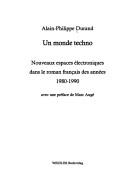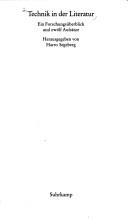| Listing 1 - 10 of 121 | << page >> |
Sort by
|
Book
Year: 2020 Publisher: Florence : Firenze University Press,
Abstract | Keywords | Export | Availability | Bookmark
 Loading...
Loading...Choose an application
- Reference Manager
- EndNote
- RefWorks (Direct export to RefWorks)
Over the last decade, considerable attention has been paid to how the information society and digital tools are changing the cultural and linguistic scene where literary production takes place. But what are the roots of this change and of the consequent debate? This book was created with the aim of studying how two of the most influential Italian writers of the second half of the 20th century, Italo Calvino and Paolo Volponi reacted to the initial diffusion of information technologies in the mid-fifties by wondering about the function of literary language and artistic creativity in a context of intelligent machines and mass information. Eleonora Lima carefully analyses some of the lesser known texts by the two authors, and discusses the opposition between the natural and the technological world in a society where information has become a product and a good to be exploited. She reconstructs the prerogatives and identities of biological and mechanical subjects, as defined by the then emerging cybernetic science. Finally, she investigates the political role of television representation in the years of dispute and terrorism. The comparative analyses, organized by thematic nuclei which are preceded by an overall historical and methodological framework, reveal the ways in which a 'remediation' process took place in writing, and show how, with new and often divergent strategies, the two narrators have faced the need to adapt literary tools to the changed communication context in a very personal way.
Book
ISBN: 906617238X Year: 1999 Publisher: De Balie
Abstract | Keywords | Export | Availability | Bookmark
 Loading...
Loading...Choose an application
- Reference Manager
- EndNote
- RefWorks (Direct export to RefWorks)
Book
ISBN: 3839456363 Year: 2022 Publisher: Bielefeld : transcript Verlag,
Abstract | Keywords | Export | Availability | Bookmark
 Loading...
Loading...Choose an application
- Reference Manager
- EndNote
- RefWorks (Direct export to RefWorks)
Von Technik und Ästhetik zu sprechen, heißt, sich bereits begrifflich auf ein Feld einzulassen, das mindestens zwei divergente Perspektiven gemeinsam denkt. Dabei haben das Technische wie das Ästhetische die Bedeutung einer Interdependenz aufzuweisen: Das Technische konstituiert einerseits Funktionen, Formen und Gebrauchsaspekte - ästhetische Zustände evozieren andererseits zeichenhafte Realisierungen, phantasmatische Urteile und wahrnehmungsvermittelte Phänomene des Erscheinens. Die Beiträger*innen des Bandes zeigen, wie bei der Konfrontation von Technik und Ästhetik eine Art Verkopplung und intrinsische Dynamik qua techno-ästhetischer Evokation entstehen kann.
Aesthetics. --- Technology in literature. --- Radio broadcasting Aesthetics --- Aesthetics

ISBN: 3896937200 Year: 2004 Publisher: Berlin Weidler
Abstract | Keywords | Export | Availability | Bookmark
 Loading...
Loading...Choose an application
- Reference Manager
- EndNote
- RefWorks (Direct export to RefWorks)
French fiction --- Technology in literature --- History and criticism
Book
ISBN: 3261016299 Year: 1976 Publisher: Bern
Abstract | Keywords | Export | Availability | Bookmark
 Loading...
Loading...Choose an application
- Reference Manager
- EndNote
- RefWorks (Direct export to RefWorks)
Poetry --- German literature --- Thematology --- anno 1900-1999 --- anno 1800-1899 --- German poetry --- -German poetry --- -Technology in literature --- History and criticism --- Technology in literature. --- History and criticism. --- Technology in literature

ISBN: 3518282557 Year: 1987 Publisher: Frankfurt am Main Suhrkamp
Abstract | Keywords | Export | Availability | Bookmark
 Loading...
Loading...Choose an application
- Reference Manager
- EndNote
- RefWorks (Direct export to RefWorks)
82.04 --- German literature --- -German literature --- -Technology in literature --- Industry in literature --- Industries in literature --- Literaire thema's --- History and criticism --- Industries in literature. --- Technology in literature. --- History and criticism. --- 82.04 Literaire thema's --- Technology in literature --- Young Germany
Book
ISBN: 9781441183194 1441183191 Year: 2013 Publisher: London Bloomsbury
Abstract | Keywords | Export | Availability | Bookmark
 Loading...
Loading...Choose an application
- Reference Manager
- EndNote
- RefWorks (Direct export to RefWorks)
"Twentieth-century literature changed understandings of what it meant to be human. Mads Rosendahl Thomsen, in this historical overview, presents a record of literature's changing ideas of mankind, questioning the degree to which literature records and creates visions of the new human. Grounded in the theory of Niklas Luhmann and drawing on canonical works, Thomsen uses literary changes in the mind, body and society to define the new human. He begins with the modernist minds of Virginia Woolf, Williams Carlos Williams and Louis-Ferdinand Celine's, discusses the society-changing concepts envisioned by Chinua Achebe, Mo Yan and Orhan Pamuk. He concludes with science fiction, discussing Don DeLillo and Michel Houellebecq's ideas of revolutionizing man through biotechnology. This is a study about imagination, aesthetics and ethics that demonstrates literature's capacity to not only imagine the future but portray the conflicting desires between individual and various collectives better than any other media. A study that heightens reflections on human evolution and posthumanism"--
Multi
ISBN: 9171731784 9789171731784 Year: 2003 Publisher: Goteborg Daidalos
Abstract | Keywords | Export | Availability | Bookmark
 Loading...
Loading...Choose an application
- Reference Manager
- EndNote
- RefWorks (Direct export to RefWorks)
Theses --- Prosa. --- Schwedisch. --- Swedish literature --- Swedish literature. --- Technology in literature. --- History and criticism --- 1900-1999. --- Geschichte 1965-1970. --- Technology in literature
Book
ISBN: 9781350303843 9781350077591 9781350077621 9781350077607 9781350077614 1350077623 1350077607 1350077593 Year: 2022 Publisher: London Bloomsbury Academic
Abstract | Keywords | Export | Availability | Bookmark
 Loading...
Loading...Choose an application
- Reference Manager
- EndNote
- RefWorks (Direct export to RefWorks)
"Technical automation - the ability of manmade (or god-made) objects to move and act autonomously - is not just the province of engineering or science fiction. In this book, Maria Gerolemou, by taking as her starting point the close semantic and linguistic relevance of technical automation to natural automatism, demonstrates how ancient literature, performance and engineering were often concerned with the way nature and artifice interacted. Moving across epic, didactic, tragedy, comedy, philosophy and ancient science, this is a brilliant assembly of evidence for the power of 'automatic theatre' in ancient literature. Gerolemou starts with the earliest Greek literature of Homer and Hesiod, where Hephaestus' self-moving artefacts in the Iliad reflect natural forces of motion and the manufactured Pandora becomes an autonomous woman. Her second chapter looks at Greek drama, where technical automation is used to augment and undermine nature not only through staging and costume but also in plot devices where statues come to life and humans behave as automatic devices. In the third chapter, Gerolemou considers how the philosophers of the 4th century BCE and the engineers of the Hellenistic period with their mechanical devices contributed to a growing dialogue around technical automation and how it could help its audience glance and marvel at the hidden mechanisms of self-motion. Finally, the book explores the ways technical automation is employed as an ekphrastic technique in Late Antiquity and early Byzantium"-- Provided by publisher.
Greek literature --- Technology in literature. --- Machinery in literature. --- Robots in literature. --- Automatic machinery --- Technology --- History and criticism. --- History --- Technology in literature --- Machinery in literature --- History and criticism
Book
ISBN: 1108629296 1108676081 1108672256 1108426042 Year: 2018 Publisher: Cambridge : Cambridge University Press,
Abstract | Keywords | Export | Availability | Bookmark
 Loading...
Loading...Choose an application
- Reference Manager
- EndNote
- RefWorks (Direct export to RefWorks)
Modernism reshaped novel theory, shifting criticism away from readers' experiences and toward the work as an object autonomous from any reader. Novel Theory and Technology in Modernist Britain excavates technology's crucial role in this evolution and offers a new history of modernism's vision of the novel. To many modernists, both novel and machine increasingly seemed to merge into the experiences of readers or users. But modernists also saw potential for a different understanding of technology - in pre-modern machines, or the technical functioning of technologies stripped of their current social roles. With chapters on Henry James, Ford Madox Ford, Wyndham Lewis, and Rebecca West, Novel Theory argues that in these alternative visions of technology, modernists found models for how the novel might become an autonomous, intellectual object rather than a familiar experience, and articulated a future for the novel by imagining it as a new kind of machine.
Modernism (Literature) --- English literature --- Technology in literature. --- Literature and society --- History and criticism. --- History
| Listing 1 - 10 of 121 | << page >> |
Sort by
|

 Search
Search Feedback
Feedback About UniCat
About UniCat  Help
Help News
News